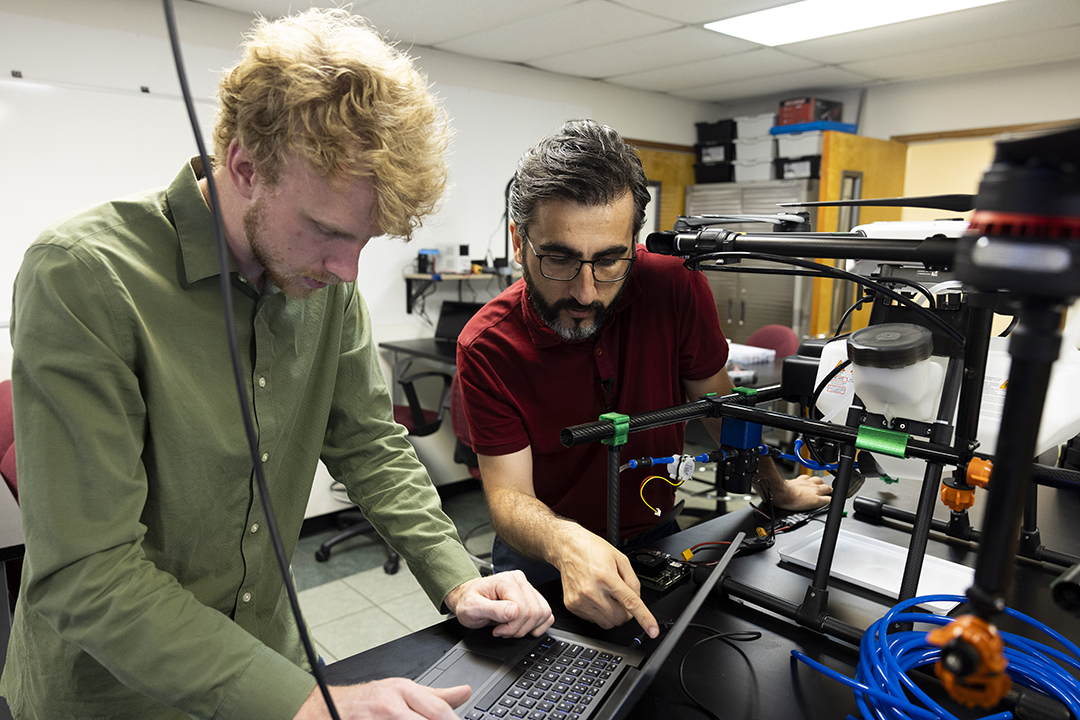Biological & Agricultural Engineering
Graduate Degrees Available: Master of Science in Biological Engineering and Doctor
of Philosophy
Graduate Programs

The Department of Biological & Agricultural Engineering at the University of Arkansas
is dedicated to the success of our Master's and Ph.D. program students. Our mission
is to cultivate students' abilities in engineering and scientific understanding, empower
them to tackle research, development, and design challenges, and prepare them to excel
as educators or practitioners in their fields of interest.
Why Choose this Degree
Our Master's and Ph.D. programs offer students the chance to tackle real-world challenges in classroom, field, and laboratory settings, supported by state-of-the-art facilities, cutting-edge technology, and dedicated faculty.- Making a positive impact on our planet through sustainable water, food, energy, and agricultural systems
- Hands-on laboratory and research experiences
- Being a part of cutting-edge research
- Our graduates are in high demand with 95% job placement
- Solve problems that impact every human
- Personal attention from outstanding faculty who are experts in their fields
- Be a part of creating sustainable solutions that have a positive impact on the earth and human life through life-enhancing and life-saving products.

BAEG Graduate and Professional Scholars Association
Join the Biological and Agricultural Engineering Graduate and Professional Scholars Association to enhance your graduate experience, connect with peers, and make a collective impact. For more information about how to get involved contact Dr. Becca Muenich.Connect with Graduate Student Support Offices
Graduate Admissions and Recruitment
340 N. Campus Drive
Gearhart Hall 213
1-866-234-3957
gradinfo@uark.edu
Graduate Fellowships and Program Support
340 N. Campus Drive
Gearhart Hall 273
479-575-5869
gradfunding@uark.edu
Graduate Student Support
340 N. Campus Drive
Gearhart Hall 272
479-387-3841
gradsupport@uark.edu
Additional Degree Information
Admissions Requirements
All Requirements and deadlines apply to PhD and MS programs
GRE
301 or above (verbal and quantitative), students directly from B.S. 307 and above
GPA
3.0 GPA
* PhD when entering directly from BS: 3.5 GPA
**18 hrs of ENG course work when entering without BS in ENG
English Requirements (for students who didn’t complete degree from a U.S. university whose first language is not English)
English proficiency exam taken within 2 years of application, for list of approved exams and required scores click here.
Other materials
Statement of Purpose, CV/Resume, Three letters of recommendation
Deadlines
Priority Deadline: Fall admission: January 15, Spring admission: October 1
Regular Deadline: Fall admission: May 1, Spring admission: October 1
Graduate Program Coordinator: Dr. Jin-Woo Kim, E-mail: jwkim@uark.edu
Apply Here
Courses
Program Objectives & Outcomes
The faculty of the Biological Engineering program seeks to provide a challenging technical education in a safe, secure and inclusive learning environment that promotes a desire for service and prepares graduates to:
- Successfully practice engineering involving the design and management of sustainable water, food, energy and related biological systems,
- Make ethical, valuable and sustained contributions that benefit employers, communities, Arkansas and the world, and
- Succeed in graduate education or continuing professional development, as needed for professional growth and licensure.
Student Outcomes
In order to prepare graduates to attain our Educational Objective, the following student outcomes were defined:
- An ability to identify, formulate, and solve complex engineering problems by applying principles of engineering, science, and mathematics
- An ability to apply engineering design to produce solutions that meet specified needs with consideration of public health, safety, and welfare, as well as global, cultural, social, environmental, and economic factors
- An ability to communicate effectively with a range of audiences
- An ability to recognize ethical and professional responsibilities in engineering situations and make informed judgments, which must consider the impact of engineering solutions in global, economic, environmental, and societal contexts
- An ability to function effectively on a team whose members together provide leadership, create a collaborative and inclusive environment, establish goals, plan tasks, and meet objectives
- An ability to develop and conduct appropriate experimentation, analyze and interpret data, and use engineering judgment to draw conclusions
- An ability to acquire and apply new knowledge as needed, using appropriate learning strategies.